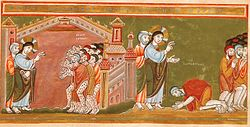“O that you would tear
open the heavens and come down…” (Isaiah
64:1a)
Advent One has always
given me a pain. I’ve said it before. I just don’t like all that “sun will be
darkened,” end-of-the-world jawn we find in the appointed gospel lesson (Mark
13:24-37). It reminds me too much of the early 1970’s when all the hippie Jesus
Freaks (including my sister) were reading that monumental piece of steaming
crap The Late Great Planet Earth and
were expecting to be raptured into the clouds. With the Yom Kippur War of 1973,
the Holy Rollers were certain Hal Lindsey’s “prophesies” were coming true, the
Battle of Armageddon was beginning, and it was just a matter of time before
Jesus swooped down and caught up all the “real” Christians in the clouds—saving
them from the sulfuric tribulation God was about to visit upon the wicked of
the earth. As you’ll recall, it didn’t happen.
I take some solace from
Jesus’ words to his disciples in verse 32: “But about that day or hour no one
knows, neither the angels in heaven, nor the Son, but only the Father.” So,
okay. If Jesus wasn’t let in on the secret, I don’t think Hal Lindsey was
either. But I’ll bet, given the genuine horror we’re witnessing in Gaza right
now, some preachers somewhere are busy telling their flock to start packing
their spiritual bags because the End is coming.
Of course, if it isn’t, we should be prepared for that,
too.
I used to get out of
preaching Advent One sermons by asking guest preachers to cover that Sunday.
This year, I’m going to sneak around it by focusing on the appointed First Lesson,
Isaiah 64:1-9. But first, let me just summarize the points Jesus makes in the
gospel. If you look at a fig tree sprouting leaves, you don’t need a crystal
ball to know the seasons are changing. Stuff is changing all the time, so get
used to it. Second point: stuff happens when you don’t expect it, so be
watchful all the time. I think maybe the Lord is telling us not to get too
stuck on what we lose when things change. Rather, it’s wise to be looking
forward to what our new possibilities might be.
So now let’s take a look
at Isaiah. Chapter 64 is right near the end of the book, or in what smart Bible
scholar folks call “Third Isaiah.” Whoever put ink to papyrus and wrote this
part of the book was probably doing so sometime between 538 and 445 BCE. Somewhere
in that give-or-take ninety year period the Jews who were living as captured
exiles in Babylon returned to Israel and started rebuilding the land their
parents had been telling them about. Suffice it to say, things weren’t as
groovy as the old folks had remembered. Jerusalem was in ruins, there was no
temple on Mount Zion, and it looked like half the remaining folks who weren’t
exiled had screwed up the Jewish faith and were worshiping in some weird
semi-Assyrian manner. Everything was chaotic, and this was, as you can imagine,
a pretty big letdown for the returning exiles.
I suspect we can identify
with these folks in a small way. We’ve returned from our exile due to COVID,
only to find a severe drop-off in church attendance—an experience which seems
common to just about every congregation everywhere. Stuff isn’t going back to
the way we remembered it. What’s worse, the whole world has been more than
normally insane lately. There’s war in Israel and Gaza, war in Ukraine, and war
in the US House of Representatives. There’s probably been war at your Thanksgiving
dinner table too as we Americans seem to be as polarized as we’ve been since the
Civil War.
There’s a lot with which
we can identify in this poignant and poetic passage from the Hebrew Scriptures.
Don’t you, like the prophet, just want God to rip the sky open, come down, and
straighten out the mess we’re in? Wouldn’t that be cool?
As the Jesus Freaks of
the ‘70’s learned, that’s probably not going to happen.
There’s a real poetic desperation
in this passage. Look at verse 5: The prophet looks like he’s saying, “God, you
got mad at us and walked away. So it’s your
fault that we floundered around and made stuff worse! Now everything really
sucks.” He’s articulating a feeling of being abandoned, isolated, and doomed.
BUT: Down in verse 8 he
drops the crumb of blessing: “Yet, O Lord, you are our Father.” A real, genuine, righteous dad never completely turns his
back on his rotten kids. He can’t. They’re his kids. My graduate school days
were, as I recall, quite penurious. I used to sell my blood plasma twice a week
for grocery money. Still, I knew that if I were ever in a real jam I could always
call my dad and ask for help. He might get mad because I was a lousy, careless,
irresponsible steward of money, but he’d still bail me out. That’s what dads
do.
In verse 9 the prophet of
Third Isaiah reminds God—and, by extension, us—that
we are still God’s people. God is the potter, and we are the clay God has
shaped and formed and loved. The days are growing darker, shorter, and colder.
The world is just getting weirder and scarier. But we are the Advent people. We
light candles in the darkness. We settle in for the long night and winter ahead.
It does no good to mourn the past. We keep our lights lit and stay awake to see
what opportunities lie ahead.
A blessed Advent to you,
my friend!



